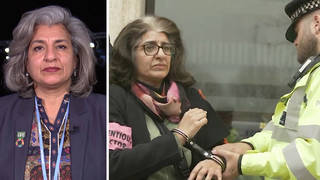
Shortly after arriving in France for the United Nations climate summit, President Obama laid a single rose at a memorial for the victims of the Paris attacks outside the Bataclan, the concert hall where the deadliest violence took place on November 13. Democracy Now! visited the site on Saturday night.
Transcript
AMY GOODMAN: We’re here for two weeks covering the U.N. climate summit in Paris, France. Shortly after arriving in Paris after midnight, President Obama laid a single rose at a memorial for the victims of the Paris attacks visiting the Bataclan, the concert hall where the deadliest attacks took place on November 13th. Democracy Now! visited the site on Saturday night.
AMY GOODMAN: I’m Amy Goodman, host of Democracy Now! We’re at the site of the Bataclan theater. That’s where on November 13th, 2015, more than 80 people were killed as a concert was going on—Eagles of Death Metal. In fact, their name is still on the marquee. Thousands upon thousands of people have streamed by in the days since, laying down flowers, candles, putting up signs, like one that said ”Je suis Paris, Je suis Bamako, Nous sommes humanité,” “I am Paris, I am Bamako, We are humanity.” People come here, they light candles, they cry, they remember.
Can you tell us your name?
KARIM: Karim, Karim. [translated] My feelings today, I am very sad. I am very sad because days ago, people were killed here, assassinated. I came here today to reflect and to say that not all Muslims are like the ones who perpetrated the crimes that we see here today. Today, we are all Bataclan, we are all the hundred victims. I needed to come here today. I needed to come here today to say that Islam is not this that we see here. And when I left the metro station, on behalf of Jews, on behalf of Catholics, on behalf of everyone, I cried, because it’s important, on behalf of everyone, that I be here today.
AMY GOODMAN: As we leave the Bataclan theater and pass the Gare du Nord, which is the train station, we see The Place to B. Our tour guide now is Frédéric Martel, who is a journalist and researcher with Radio France, Radio France, which is public radio in France. Well, welcome to Democracy Now! Can you talk about this Place to B? What is it?
FRÉDÉRIC MARTEL: They decide to give this name to this place, which is actually an hostel where you can have 600 people.
AMY GOODMAN: This is a hostel.
FRÉDÉRIC MARTEL: Yes, 600 people can sleep here, can live here. And actually, for the COP21, it’s going to be bloggers and journalists that are kind of underground. They are not necessarily accredited, accepted by the official COP. So they will live here. And you have you have one, two, three, four, five, six restaurant, café. And all these places become press room, meeting rooms, a production room, where, like, activists and bloggers can meet, can organize also their counter COP. So, it’s a place for the civil society, where basically people that are not the official one can do their own COP21.













Media Options